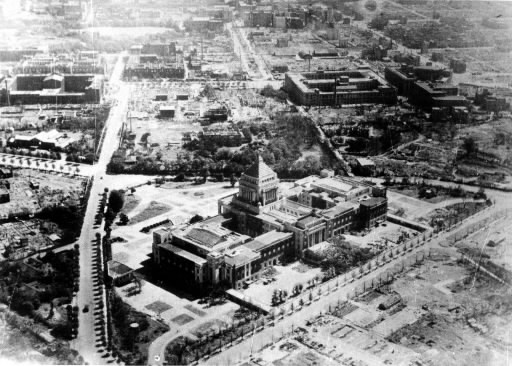Trust: The Memoirs of Akira Yamamoto, Part 9
Oct. 12, 2012
Part 9: Probationary naval officer
Solidarity while tolerating unreasonableness
On September 30, 1944 I entered the navy’s accounting school in Tsukiji (Chuo Ward, Tokyo) as a member of the 12th class for naval paymaster probationary officers. Only ten other members of the Otake Kaiheidan came with me to Tokyo. While those who had come directly from university were feeling bewildered, we were pretty relaxed. But that didn’t last long. Our education and training became even tougher. But that was to be expected. Officers had to be trained in a mere six months. It was wartime – and nearing the end of the war at that.
We did sumo wrestling wearing loincloths made out of canvas, sailed cutters, got in shape by running double time and did group drills. One person’s mistake was everyone’s responsibility, and when a mistake was made we were punished by being forced to form lines and exchange blows with the soldier in the line in front of us and sit on our knees in the schoolyard in the snow during the dead of night. Our meals gradually became poorer and sparser. Everyone suffered hunger pangs. We ate the heads and guts of sardines. When I saw a tangerine peel while double-timing outside the school, I wanted to pick it up and eat it.
The highlight of the course was a speech delivered by Lt. Col. Tetsuji Ikehata not long before our graduation. I lost a lot of things in the atomic bombing, but three notebooks from my accounting school days inexplicably survived. One of them includes the notes I took during the speech. I recall that near the end everyone was trembling with emotion and in tears as they listened. “Can you repel an attack on the mainland or not? Have you trained every day in that spirit? Those who stand in the way of victory will be killed!” he screamed.
When I look at what I wrote then, I realize life at the accounting school consisted of easily becoming emotional and having an unreasonable sense of solidarity imposed on us, and I was totally disenchanted. It was frustrating having my nerves set on edge so much, and I could not accept it.
But nevertheless, I was left with a strong sense of camaraderie with those who faced these struggles with me. No matter how great the difficulty, we could get through it because we were in it together.
There were a total of 917 students in the 12th class. One of them was Kojiro Shinohara, former president of Hiroshima Sogo Bank (now Momiji Bank). Mr. Shinohara, who is now 94, said, “We believed Japan would surely win the war. We kept any anxiety or doubts to ourselves.”
Starting in late November we were allowed to go off base on Sundays, so Nobuko boarded in Yokohama and came to the Roppokan (inn) to meet me. I was always starving, so I had her bring me anything at all I could eat. Though meeting my young wife, eating was my first priority. Perhaps I should say that was a valuable experience.
On a Sunday in February or March 1945, my brother Toru (managing editor of the Chugoku Shimbun) and Hidetsuchi Kumano (head of the Yamaguchi bureau) came to the Roppokan. They said they had come to Tokyo on business for the Japan Newspaper Association (an organization that regulated the newspaper industry; it became the Japan Newspaper Corporation in March 1945). Kumano kept trying to get Toru to leave, saying they shouldn’t bother me and my wife, but, uncharacteristic of him, my brother stayed a long time and then finally left hesitantly. That was the last time I ever saw him.
At dawn on March 10, B-29 bombers dropped massive quantities of fire bombs on Tokyo, and the area around the school, including Kyobashi, Shimbashi and Tsukiji, was in flames. I was on guard duty on the third floor of the government building, and I watched the entire area become a sea of flames. That day a boat race was held as scheduled, and we headed upstream (on the Sumida River). The waterfront on both sides was burned to ashes as far as the eye could see and smoldering. It was a dreadful sight.
The war situation was becoming desperate. In late March I got my orders. I was assigned to the No. 2 Navy Air Base in Kisarazu, Chiba Prefecture. As my instructors and others who were staying behind waved goodbye to me, I left the accounting school.
(Originally published on October 5, 2012)







